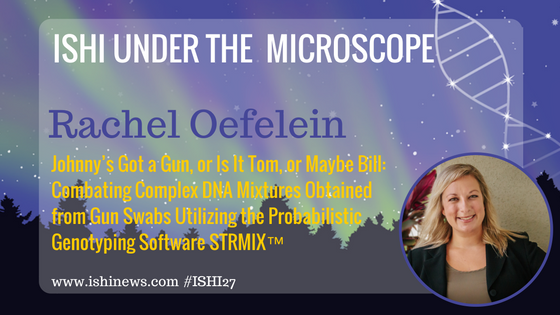The ISHI27 agenda is already filling up with some great talks from amazing speakers! While the forensic community is a tight-knit group, we can always get a little closer, right? With that in mind, we asked our speakers some questions to get to know them a little better outside of their work. We’ve been posting their responses in a feature we like to call Under the Microscope.
Today, we’re chatting with Rachel Oefelein, who will be presenting Johnny’s Got a Gun, or Is It Tom, or Maybe Bill: Combating Complex DNA Mixtures Obtained from Gun Swabs Utilizing the Probabilistic Genotyping Software STRMIX™ during the General Sessions on Wednesday, September 28th.
Rachel Oefelein is currently the Quality Assurance Manager/Senior DNA Analyst at DNA Labs International (DLI). She received her MSc in Forensic Science from the University of Strathclyde, and her BS in Criminal Justice, with a Forensic Science Minor, from Loyola University of New Orleans. Rachel worked at the Armed Forces DNA Identification Laboratory (AFDIL) for nearly five years. She interned at the Forensic Lab in Krakow, Poland, and is a board member for an animal rescue group. She is also an avid traveler!
How did you come to work in the field of forensics/DNA?
In college I was pursuing Criminal Justice, I took a Forensic Science elective and was hooked. I immediately decided to add a Forensic Science Minor.
What is your favorite thing about your job? Why?
The challenges, it is fun for me to try to determine why a sample isn’t working. I like the cold cases that aren’t straight forward and require figuring out what hasn’t already been done and trying new things.
What is the biggest challenge you face in your job?
The ever-changing field, every year a new kit is released, a new technology becomes available and forensic DNA methods become more sensitive. In many career fields you can learn a trade and perform that trade for the rest of your life. In forensic DNA, to be successful, you have to be willing to continuously learn and adapt with each new development.
What accomplishment are you most proud of relating to forensics/DNA?
I don’t know that there is a single accomplishment I am most proud of but rather a series of smaller accomplishments as a whole. The first report I signed, testifying for the first time, speaking at a conference for the first time and contributing to the military’s mission to identify missing service members at the Armed Forces DNA Identification Laboratory (AFDIL) are all moments or periods of time I treasure. However, I’d like to think maybe my biggest accomplishment is still to come, I want to keep striving for new successes.
If you’ve attended ISHI before, what keeps you coming back? If you’ve never attended before, what are you most looking forward to at ISHI27?
This will be my first time attending ISHI! I am really looking forward to hearing the other speakers and checking out the vendors to see what’s new for forensics coming into 2017.
When you were little, what career did you think you’d have as an adult?
I always thought I would be a doctor or veterinarian. However, one of my best friends has a picture of me in a lab coat with safety glasses making geodes when I was in 3rd grade so maybe the whole science thing was a foregone conclusion…
Where do you see the future of forensic science headed?
I envision a lot more standardization and applications of statistical models to other fields in forensic science comparable to what we see in forensic DNA; however, change doesn’t happen overnight and I think it will be years before we see the completion of things like universal certification requirements, OSAC standards for all fields, etc.
What do you hope the audience learns/takes away from your talk?
I’m hoping that the audience will take away the message that probabilistic genotyping isn’t scary! I find that people I talk to are often nervous for how it will change courtroom testimony, statistical education requirements, report wording, etc. The worst scenario is for a laboratory to validate a probabilistic genotyping software and be afraid to use it; hopefully, my talk will help people to warm up to the changes in statistical modeling for forensic DNA and be excited about what’s to come.
What person would you say has had the biggest influence in your career?
Adrian Linacre was one of my professors in graduate school and one of my supervisors for my dissertation. He was a tough teacher and would always put me on the spot in class, it forced me to study harder and prepare more so I was ready for whatever questions he would throw at me. These question and answer sessions were also great preparation for expert witness testimony. I always thought I would go into bloodstain pattern analysis and he helped me to realize that forensic DNA could be fun and wasn’t just an endless monotonous sea of G’s, T’s, A’s and C’s.
If you could time-travel, what year would you go to and why?
I would head back around 67 million years so I could see dinosaurs, specifically Ankylosaurus because that spiny guy with the crazy tail is my favorite.
Star Wars or Star Trek?
Star Wars. Obviously.
WOULD YOU LIKE TO SEE MORE ARTICLES LIKE THIS? SUBSCRIBE TO THE ISHI BLOG BELOW!


